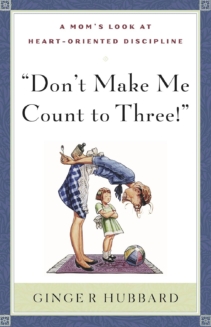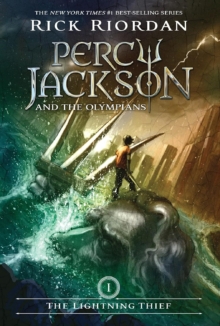Learn more about the journey that led to us equipping kids to carefully evaluate every idea they encounter.
Meet members of our team who have contributed to curriculum development.
Hear from real users of the Foundation Curriculum.
Learn what we believe about God, Jesus, Scripture, and more.
July 2025 Book Club Recommendations
Book for Adults

Don’t Make Me Count to Three: A Mom’s Look at Heart-Oriented Discipline
Ginger Hubbard
Have you ever struggled to find balance in correcting your child’s outward behavior and pointing their heart toward Christ? For most parents, the struggle is real, and, in the younger years, intense. If you are looking for practical biblical wisdom on how to correct your child’s sinful behavior while reaching the heart, this book is for you! Filled with biblical wisdom, practical application, and humorous anecdotes, Don’t Make Me Count to Three provides a game plan for parents seeking to raise their children in the discipline and instruction of the Lord.
Book for Children Ages 8-12

The Lightning Thief, Book 1 of Percy Jackson and the Olympians
Rick Riordan
Percy Jackson has always thought of himself as a delinquent. He has trouble in school because of his dyslexia and ADHD, frequently gets into disagreements, and struggles to control his temper. However, his world is turned upside down when he discovers he is the son of a Greek god and is sent on a dangerous quest. Can Percy and his other half-blood friends retrieve Zeus’ lightning bolt before a war is started between the gods?
Note for Parents: This story is best suited for children ten and over. We know that some parents may not want to engage with this story, as it portrays the Greek gods as real and focuses on the adventures of several half-blood children of the gods. We have chosen to feature this book for several reasons. It is a well-written and engaging story. It is an easy way for children to learn Greek mythological history. Most importantly, it can be used to highlight how amazing God’s attributes are when compared with the petty, backbiting, self-centered Greek pantheon. However, as with all books recommended in the Book Club, we encourage you to prayerfully follow your conscience regarding which books you allow your children to engage with.
Questions Just for Fun
If you could choose between Percy’s pen-sword, Riptide, and Annabeth’s Yankees cap of invisibility, which would you choose and why?
Which part of Percy’s adventure would you have most enjoyed being part of?
Questions to Think Critically and Biblically
According to Greek mythology, all of the gods are created beings–six gods were children of Kronos, and the others were children of Zeus. How is this different than how the Bible presents God?
Read Genesis 1:1-5. Discuss how God is not created. He is the eternal creator who has always existed. Read John 1:1-5. Discuss how Jesus is God, the second person of the Trinity, and that he has always existed.
Everyone at Camp Halfblood is a child of a Greek god and a mortal human. Many of the Greek gods had children with multiple mortals. How is the fictional concept of a half-blood child different than the biblical truth of Jesus, the Son of God, entering the world as an infant with a human mother?
Read Luke 1:26-38. Discuss how the Greek gods were consumed with lust for humans and had sex with them. Jesus was conceived through Mary being overshadowed by the Most High. There was no sex involved. Unlike the Greek gods, whose children were conceived out of the gods’ lust for humans, God’s motive for sending His Son was His love for humans and His desire to rescue them from their sin.
Choose one of the gods Percy met on his quest. What was that god like? How is that Greek god different than the God of the Bible?
Choose one of the following gods and discuss the following:
- Dionysus is grumpy and selfish.
- God is unchanging, not led by the whims of unstable emotions (Hebrews 13:8).
- God is love. He focuses on our good (1 John 4:8, Romans 5:8).
- Ares is hateful, selfish, and loves war.
- God is love (1 John 4:8). He loved us even in our sin by sending Jesus (Romans 5:8).
- Jesus is the Prince of Peace (Isaiah 9:6) and has bought us peace with God and with one another (Ephesians 2:14-17).
- Hades is envious of his siblings, unforgiving, and selfish.
- God is exalted above all, not envious of others (1 Chronicles 29:11-12).
- God is just and merciful (Exodus 34:6-7).
- God is love. He focuses on our good (1 John 4:8, Romans 5:8).
- Zeus is easily angered, unforgiving, and self-centered.
- God is unchanging, not led by the whims of unstable emotions (Hebrews 13:8).
- God is just and merciful (Exodus 34:6-7).
- Poseidon is uncertain of his love for Percy.
- God is love (1 John 4:8). He loved us so much, even in our sin, that He sent Jesus (Romans 5:8).
At the end of the book, when Luke shows his true colors, he claims that the gods are just using Percy for their own selfish purposes. In a way, he is right. Posiden claimed Percy as his son only because Posiden was accused of stealing Zeus’ bolt, and he wanted to clear his name. Ares used Percy to retrieve his shield and then attempted to start a war between Zeus, Poseidon, and Hades. Hades used Percy to get his helmet back. And Zeus used Percy to get back his bolt. How does the way the gods use Percy differ from how God treats his children?
Read Acts 17:24-25. Discuss how God is self-sufficient. He has all that He needs within himself. He doesn’t need us, yet He chooses to love us and desires a relationship with us.
Bonus Question - If you have gone through Foundation Careful Thinking Curriculum, ask, “What mistake in careful thinking does Ares use to try to manipulate Percy?”
Review the truths covered in Unit 3, Lesson 3, and discuss how Ares confuses feelings for support. He tries to make Percy feel angry so that Percy will do what Ares wants him to do.
Book for Children Ages 4-7

King Hugo’s Huge Ego
Chris VanDusen
King Hugo is convinced that he is better than everyone else, and insists that everyone cater to his every need. That is, until one day when something strange starts to happen to his head. Every time he talks about how great he is, his head becomes just a little bit bigger.
Note for Parents: Please be aware that one of the characters in this book is a sorceress. It is this character that teaches King Hugo that he should not be proud. However, we know that the presence of this character may lead some families to choose not to engage with this book.
Questions Just for Fun
If your head suddenly became huge, what are some things you would have trouble doing?
Questions to Think Critically and Biblically
King Hugo expected everyone else in his kingdom to serve him. Is this how God wants people in authority to treat one another?
Discussion Guide - Read Matthew 20:25-27. Discuss how God has called leaders to lead others by serving them.
King Hugo thought about his own greatness all the time. The word the Bible uses to describe this is pride. According to the Bible, what does God think about pride?
Discussion Guide - Read 1 Peter 1:5-7. Discuss how God opposes the proud. This means he works against people’s pride. Pride is putting ourselves in God’s place, and it always harms us.
King Hugo learned the truth about who he was and how he was acting when Tessa deflated his head, and he heard all the prideful things he had said and done. Where should we go to learn the truth about who we are and how we should live?
Discussion Guide - Read 2 Timothy 3:16-17. Discuss how God’s word revealed the truth to us about who God is, who we are, and how God has called us to live.
Bonus Question - If you have gone through Foundation Attributes of God Curriculum, ask, “What is one attribute of God that shows how different he is as our King than King Hugo was to his subjects?”
Discussion Guide - Discuss any of the following attributes.
- God Is Wise - God Always Knows and Does What Is Best
- King Hugo was foolish. He didn’t understand what was best.
- God Is Good - God Always Acts Kindly Toward His Creation
- King Hugo was mean. He treated people unkindly if they didn’t do whatever he wanted.
- God is Love - God Gives of Himself
- King Hugo was selfish. He only thought about himself. He never gave of himself for the good of his people.
You can help solidify each attribute you discuss by reviewing the verse associated with each attribute and playing one of the games played in the curriculum when learning that attribute.
Join the Foundation Worldview Book Club
Each month we provide recommended reading with discussion questions for you and your child. Don't miss next month's recommendations from Foundation Worldview!
